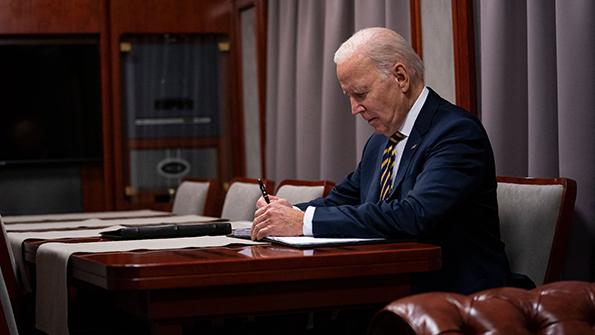Opinion: We Are Tempting Armageddon In Ukraine

Russian threats of nuclear use have grown increasingly serious as Ukrainian forces, buttressed by Western support, have pressed forward against the Russian front lines in Ukraine. In his Feb. 21 address to the Russian Federal Assembly, Russian President Vladimir Putin explicitly claimed “an existential threat,” citing U.S. officials’ talk of seeking Russia’s strategic defeat. Putin also suspended participation in the New START arms control treaty and directed the military to prepare to resume nuclear testing, asserting that Washington was doing the same. This may reveal his next move.
Along its present course, the Ukraine conflict likely will culminate in a U.S.-Russia standoff more serious than the 1962 Cuban missile crisis. Washington contends that Putin’s nuclear threats ring hollow and that U.S. counterthreats are a sufficient deterrent. This is a grave miscalculation. Washington misconstrues Moscow’s perspective in several ways that obscure the risk of nuclear use.
First, Moscow sees the current conflict as a strategic showdown with the West that has profound implications for Russia’s global sway. Washington sees this as well, but contends that Moscow is caught in a corner without practicable exit options. This is wrong.
Second, as Moscow sees it, the advance of NATO-enabled Ukrainian forces presages the advance of NATO itself. For 30 years, Moscow has called the eastward expansion of NATO a critical security concern. For just as long, NATO leaders have denied it. What matters, however, is whether Moscow is sincere in fearing the leverage that NATO might gain by sitting forces on Russia’s long border with Ukraine.
Third, many Western observers suggest that Moscow will not risk the U.S. retaliation that a resort to nuclear weapons would bring—as though Moscow has no option for counterretaliation. Putin reasonably might wonder: Is Washington ready to sacrifice Boston for, say, the Ukrainian 92nd Mechanized Brigade? For that matter, how much risk are the NATO allies willing to assume? Their commitment to “staying the course” in Ukraine is the target of Putin’s threats.
The outcome of the Ukraine war will profoundly affect Russia’s stature and influence as a global power. It also will affect the nation’s internal stability. The conflict asks: Can Russia win even a local war against an adversary supported by the West? Does Russia’s massive nuclear arsenal count for much in the contest of powers? In this light, the conflict should count at minimum as a “near-existential” crisis for Moscow—“check,” if not quite “checkmate.”
Facing conventional defeat, Moscow would have a variety of nuclear options. The least likely of these is garnering the most attention in the West: an attack on Ukrainian forces using so-called “tactical” nuclear systems. Such weapons would not be effective enough to blunt a major Ukrainian offensive unless used in numbers that would also put Russian troops and areas at risk. Moreover, such action would earn global reprobation and invite direct U.S. intervention—Washington has pledged as much. Putin still has other, more likely options.
In the case of a decisive Ukrainian drive on the Russian border or Crimea, Moscow could signal dramatic escalation by putting its strategic nuclear forces on high alert and deploying some tactical nuclear units in an ostentatious fashion. The aim would be to break the Western consensus for war and prompt a cease-fire and negotiations. An additional step, although unlikely, would be a nuclear “warning blast” over or under Russian territory. Warning shots are entirely consonant with Russian nuclear doctrine. An underground test of a strategic weapon in violation of the Comprehensive Nuclear-Test-Ban Treaty would suffice, and it would accord with Putin’s recent statement. This would be an attempt at extended deterrence by intimidation, which also would involve any obvious increases in nuclear force readiness.
In the case of a marked rise in Russian nuclear activity, Washington would necessarily raise the alert level of U.S. nuclear forces. The result would be a confrontation more dangerous than the 1962 Cuban missile standoff—more dangerous due to the context of the Russia-Ukraine war.
An early, deadly use of nuclear weapons remains very unlikely. Realistically, it is crisis instability that poses the greatest danger of nuclear cataclysm. Any situation that prompts a bilateral resort to peak levels of nuclear readiness—a hair-trigger standoff—greatly increases the likelihood of accidental or mistaken nuclear use.
The experience of the Cuban missile crisis remains relevant to managing the current confrontation wisely. Reflecting on the crisis, McGeorge Bundy, who was President John F. Kennedy’s national security advisor during it, estimated that the crisis had involved a rather modest one-in-100 risk of nuclear war. Nonetheless, Bundy observed: “In this apocalyptic matter, the risk can be very small indeed and still much too large for comfort.” Foremost in Washington’s planning about the Ukraine conflict should be Bundy’s observation that even a very limited nuclear exchange “would be a disaster beyond history.”
Carl Conetta is a researcher at the Project on Defense Alternatives and author of “Tempting Armageddon: The Likelihood of Russian Nuclear Use Is Misconstrued in Western Policy.”
The views expressed are not necessarily those of Aviation Week.





Comments
I do object to the headline -- "we" aren't tempting armageddon -- the Russians have done.